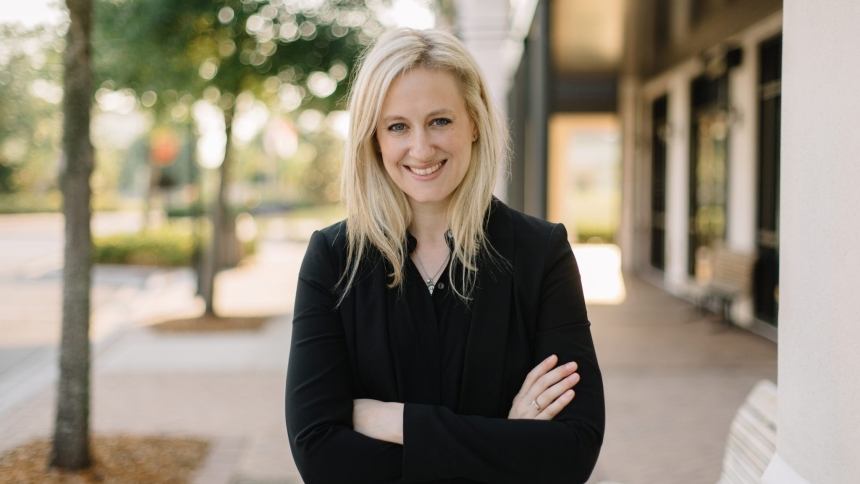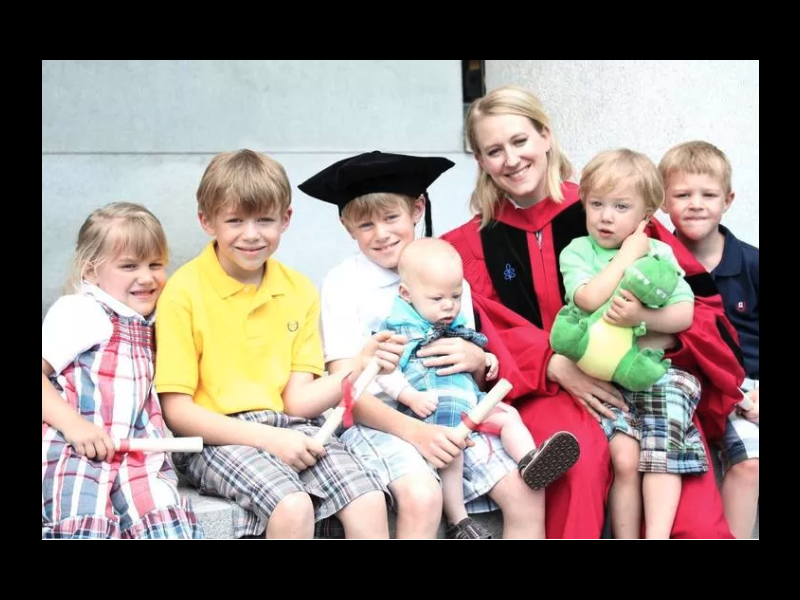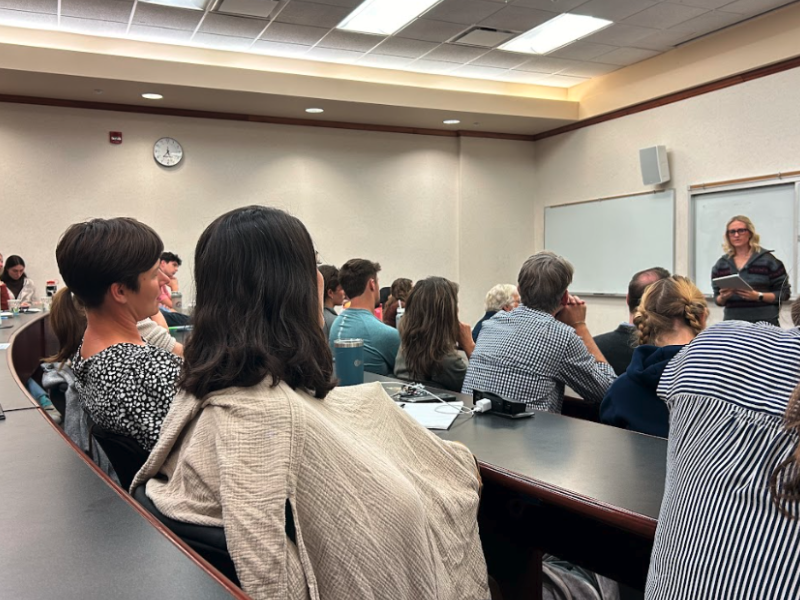
In the midst of a historic "birth dearth," why do some five percent of American women choose to defy the demographic norm by bearing five or more children?
That was the big question posed – and answered – at Hillsdale College on October 3, 2024 by Dr. Catherine Pakaluk of Catholic University of America. Dr. Pakaluk, pictured, is the author of the recent book, “Hannah’s Children: The Women Quietly Defying the Birth Dearth”.
After the event, Dr. Pakaluk sat down for an interview with Caroline Kurt, a Junior at Hillsdale College, studying English and Journalism, and a parishioner at Saint Anthony in Hillsdale. Caroline writes:
We need to reframe the way we think about children and families, Catherine Ruth Pakaluk told her audience at Hillsdale College.
The author of Hannah’s Children: The Women Quietly Defying the Birth Dearth, released this March, spoke Oct. 3 to an audience of 70 students, professors, and parents at an event organized by the political economy group Praxis.
Pakaluk, an associate professor of social research and economic thought at The Catholic University of America, spoke about the demographic ties between family formation and voting trends, the ethos of women who choose to have large families, and the rejection of individualism and secularity that their families embody.
“The men and women who quietly defied the birth dearth then as now have strong reasons for what they're up to,” Pakaluk said. “They weren't accidental families, people who didn't know how to use birth control. No — in fact, they're people with strong reasons, reasons I called ‘reasons of the heart.’”
Pakuluk argued many of this country’s troubles originate in a lack of openness to marriage and children.
“Ultimately, smaller families and the retreat from marriage issued out the meager virtue of our time,” Pakaluk said.
For “Hannah’s Children,” Pakaluk interviewed 55 college-educated women with 5 or more children — a group that makes up just 5% of American women — about their lifestyle choices and vision of family life.
“My subjects described their choice to have many children as a deliberate rejection of an autonomous, customized self-regarding lifestyle, in favor of a way of life intentionally limited by the demands of motherhood,” Pakaluk said in the lecture. “They were motivated by a deeply biblical worldview, characterized by trusting God and hoping in His providence.”
Pakaluk said that these women rejected the common narrative of fitting childbearing into their own narrative of self-identity.
“They believed they found themselves in having children, and that their personalities and capacities expanded so richly indeed to richly as to give rise to other persons,” Pakaluk said.
These women, Pakaluk said, allowed their beliefs about God and the meaning of life to shape their own hearts and desires.
“They had adopted a posture of openness to children as a way of life, and not as a tiny season of life,” Pakaluk said.
Large families implicitly combat the dangerous individualism so prevalent today, Pakaluk said.
“The family works against individualism by asserting a communitarian reality in a single generation,” Pakaluk said. “The self imposed, self imposed duties of an abundant, generative family life provide the ballast against selfish forms of individualism with strong, stable families.”
Maria Schmid, a Catholic junior at Hillsdale College and one of six children, described Pakaluk’s talk as affirming what she herself learned from growing up in a large family.
“Dr. Pakaluk puts a name on the experience that I've had,” Schmid said, describing the work ethic and virtues that she’d learned from her family. “It’s not these philosophical principles that remedy the cultural difficulties we see, but the educational experience of growing up in a large family.”
Schmid said she appreciated that Pakaluk discussed the Church’s part in family formation.
“I was struck too by what she said about the Church's role is really to be there, supporting families in those corporal and spiritual needs,” Schmid said.
Schmid said she was grateful to be raised by parents who made sacrifices in order to raise a strong family.
“I know my dad really ended up choosing his career with that in mind,” Schmid said, “to be able to be present to us, which was really a blessing. And mom has given so much time to our family in so many ways, and she's really gifted us with her talents.”
Lauren Smith, a mother of 6 children and parishioner at St. Anthony of Padua Catholic Church in Hillsdale, said Pakaluk’s talk captured her own experience of making the counter-cultural decision to be open to life.
“I think there is a deliberate departure from the world,” Smith said. “It doesn’t feel radical, because it’s so traditional. But in the last three, four generations there’s been such a marked decline in doing this normal family thing.”
Smith described her rejection of contraception as liberating.
“What does it take to entertain a choice like this? Trust, willingness to suffer, a risk,” Smith said. “Because it is safer, is less risky to limit your potential for suffering.”
In an interview following the lecture, Pakaluk advised students not to wait to have a family.
“Those things that look like ties that bind us, those are actually the springboard to your life,” Pakaluk said. “They secure us. They help us to see who we are. They give us something to make sacrifices for. They give us meaning to carry on in jobs that are less fulfilling.”
Pakaluk challenged the modern conception of marriage as a “capstone” to career success, financial stability, and other milestones.
“Our grandparents’ generation and the ones before, they didn't do it this way,” Pakaluk said. “ They believed that both marriage and children were a natural part of life, and these were things that you did at the beginning of your life, and that your professional work and these other sorts of things that you needed to do would be stronger for it.”
Instead of being a reward following success, Pakaluk said that marriage and family should be the foundation of one’s life. According to Pakaluk, those who wait for the “ideal” time to start a family or have the next child will never find the right time.
“Step out of this modern narrative,” Pakaluk said. “Think about marriage and childbearing as a mode of living in the world.”
Pakaluk advised Catholic parishes wishing to promote this way of life to prioritize people over programs.
“Parishes are meant to be encounters of families with each other,” Pakaluk said.
In her research, Pakaluk observed how many mothers and fathers had been converted to their way of life by meeting families open to life.
“What if the parish hall was conceived of as your dining room table, a place where people felt very comfortable to come and sit, pull up a chair, stay for a while?” Pakaluk said. “It's a facilitation of encounters, of people. Because I do think that's like the nugget of evangelization.”
* To order a copy of Hannah's Children by Dr. Catherine Pakaluk, go to: https://www.regnery.com/9781684514571/hannahs-children/


